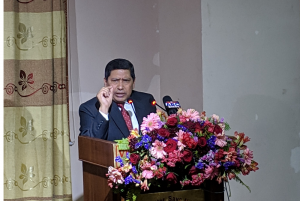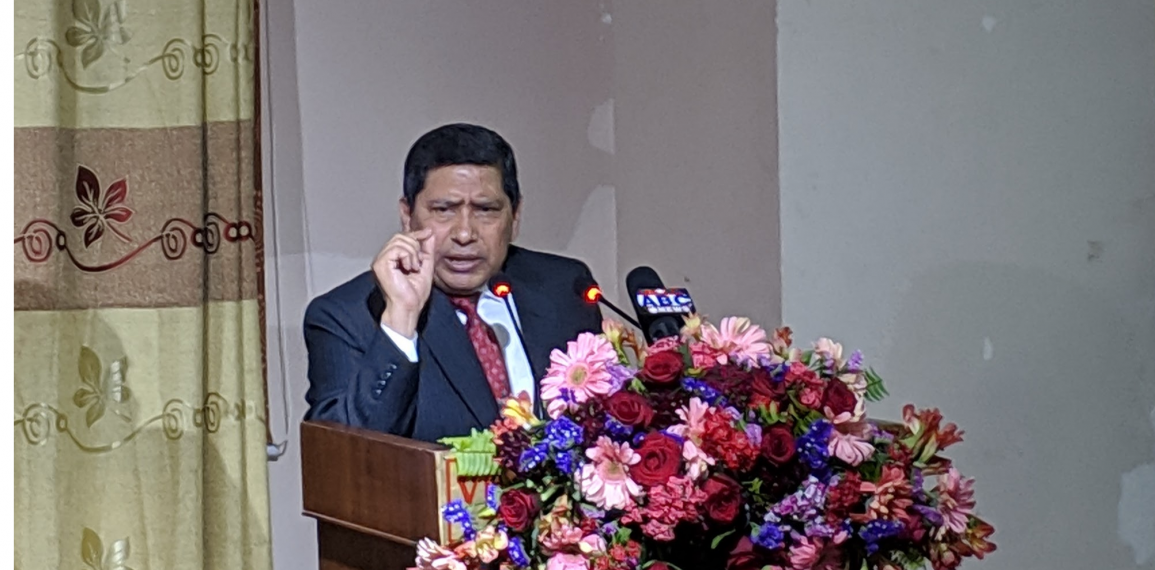Narayan Kaji Shreshta, Former Deputy Prime Minister and Spokesperson of the Nepal Communist Party speech, at International Conference on Universal Social Protection, Security and Peace, 04 April 2019, Kathmandu, Nepal
 04 April 2019, Kathmandu, Nepal
04 April 2019, Kathmandu, Nepal
Chairs of the opening session Drs. Devkota and Francine,
Rt. Honourable Former Prime Minister and Chairperson of Nepal Communist Party Pushpa Kamal Dahal “Prachanda”
Distinguished Guest at Dais,
Panelists, Participants, Media persons,
Ladies and gentlemen!
It is my great pleasure welcoming you all, particularly the distinguished foreign delegates from Europe and Asia in this Conference on social protection, security and peace.
First of all , I want to highlight the ‘Maoist people’s war and the peace process.’ The war started on February 13, 1996 and officially ended on November 21, 2006, by signing a peace accord between the warring parties –the then Maoist Party and the state. These had remained the pivotal events in the history of Nepal that paved the path for establishing republican federal Nepal and overthrow the monarchy. Although the ‘people’s war’ spearheaded by the Maoist Party was not the first armed struggle in Nepal, but it left distinct marks and reverberations in the history of armed struggles within and beyond the borders of Nepal given its nature, volume and impact on contemporary political landscapes. The struggle was started and developed by forming more organised military formations, creating a militia and earning a strong support base with an instrumental and sustainable war mechanism to challenge state power.
It is important to note that the characteristics of the Nepalese people’s war and compare those characteristics against the parameters of an actual war. The restoration of multiparty democracy in 1990 brought about hopes to the Nepalese people that they would gain more economic, social and political change. However, the hope of the people turned into frustrations due to the continuation of the previous state mechanisms and processes that was unjust, discriminatory, coercive and oppressing. A wide gap between the rich and the poor, high rate of unemployment, and a slow, ineffective and corrupt politicians and bureaucracy were the main reasons behind the people’s dissatisfaction. The rising dissatisfaction and mistrust of the people were capitalised to some extent by the Communist Party of Nepal (Maoist), and a war against multiparty political system and abolition of the monarchy was declared. The war against state power became widespread, and the Maoists were able to gain the support of lower and middle classes mainly from the rural areas. Government forces were defeated on several fronts. The state mechanism became almost defunct. Finally, a peace accord was signed in November 2006 between the Maoists and the Government of Nepal which ceased the struggle.
In contrast to other wars in the world, the people’s war gained massive success in developing a war mechanism and abolishing the social absurdities to some extent. The presence of the state was nil in those areas controlled by the Maoists, resulting in the establishment of a Maoist state mechanism. The Maoist army comprised of different caste groups, ethnicity and economic classes. The participation of women in the Peoples’ Liberation Army was up to 75%. People who were marginalised socially and economically had greater participation in the Maoist force.
The most noteworthy impact of the people’s war is the political empowerment of the lower economic class, including women and socially deprived groups. The involvement of these groups in the war trained them to be more proactive in politics. They now have greater participation not only at the local level but also in the federal parliament and governments (local, Provincial and Central). Social perversions such as consumption of alcohol, gambling, polygamy and social segregation were made punishable to some extent.
The war also brought about significant positive changes. Development responses reinforced many ‘good practices’ including transparency, accountability, localization, and more equitable distribution of benefits. The war also forced many issues, suppressed for centuries, to surface, including recognition and inclusion of diverse groups and their culture, religion and education. Conflict helped to create space for greater leadership amongst women and youth. The issues of systematized exclusion for so long and hence utmost necessity for inclusion of diverse groups of Nepal like Dalits (oppressed class based on caste system), women, indigenous people; Madhesi (people living in the plains), etc. came to the fore. The rights of differently abled people and other minority groups including their social-cultural issues, and the issues of polygamy, domestic violence and gender based violence (GBV), child marriage, land rights, etc. are now being openly discussed and resolved positively. However, it is for sure that these are mostly related with the structures of our society, so may take some long to completely do away, I think.
Many other instances of conflict are rampant throughout the nation after a decade of signing Comprehensive Peace Accord (CPA) to peacefully settle the war and enter into a new political era leading to People’s Democracy, Constituent Assembly Election, declaration of Republic nation and a new constitution drafted by the directly elected representatives of people for the first time in national history.
Human rights are the inherent rights of a person. Recognized in international laws and fundamental laws (constitutions) of the countries, human rights are considered as the basic rights that all persons are entitled to. Being a democratic country, Nepal has expressed full commitment towards human rights, as Nepal is a state party to major international human rights laws. It has enacted new laws and amended existing laws to align them with accepted international human rights instruments.
The Constitution of Nepal (2015) has ensured basic human rights as fundamental rights under the part 3, articles 16 to 46. Right to live with dignity, Right to freedom, Right to equality, Right to communication, Right to justice, Right of victim of crime, Right against torture, Right against preventive detention, Right against untouchability and discrimination, Right to property, Right to religious freedom, Right to information, Right to privacy, Right against exploitation, Right regarding clean environment, Right to education, Right to language and culture, Right to employment, Right regarding labor, Right to health care, Right to food, Right to housing, Right of women, Right of children, Right of Dalits, Right of senior citizens, Right to social justice, Right to social security, Right of consumers, Right against exile and Right to constitutional remedy have been comprised as fundamental rights. Articles 133 and 144 have empowered the judiciary to exercise extraordinary jurisdiction to enforce the fundamental rights effectively. The Constitution of Nepal (2015) has made the Human Rights Commission as a constitutional body.
In my opinion, there is very strong bondage between the provisions of social protection and enjoyment of human rights. Social protection is mandatory for ensuring full enjoyment of the human rights by those people and their groups that are so far systematically excluded and marginalized, and/or otherwise (for example old age, disability, etc.,) unable to afford for a dignified living.
I believe and fully agree that civil societies, social, labor, peasants, women and peace movements and struggles have made proposals and arguments for the need of universal social protection as a conditionality for peace, security, development and social justice. I hope, this conference will further debate, consolidate and reinforce different social movements and struggles in order to bring sustained peace and security in our societies based on the universally accepted principles of Social Justice. In the long run, we may need to work hard in the wider agenda of this conference and further strengthen cooperation among peoples and their movements across the globe.
In conclusion, you have designed many plenary and parallel and side sessions, and I believe you will have enough opportunities for brainstorming, presenting left philosophy mainly the situation in Europe and Asia in relation to unemployment, poverty and inequality, migration and climate crisis, as well as its consequences for democracy with the emergence of right-wing populism; the (new) geopolitical actors at the national and global levels; for the future of work in an era of new technologies with their consequences on labour markets; the gender and care economy problems ; Global Charter and identification of the concrete possibilities the work of social movements on social justice and many more; We are looking forward for your Kathmandu Call for Actions and Declaration as well.
With this, I remain, Thanks for all!



